 I’ve come to the conclusion that while still very entertaining and intriguing, Lost has become a completely different show. Once falling in the realm of myth or sci-fi/fantasy, now, I’d say it’s more some suspense/action adventure drama. There really isn’t a lot of mythology on the show anymore, and that is exactly the scenario I had feared which inspired me to write The Myth of Lost. At only three episodes into the new season, Lost definitely has time to redeem itself, but I really wish it would start answering the questions about the mythology before giving us new, relatively unrelated plot mysteries. Still, the more questions Lost leaves unanswered, the more satisfying a book with a theory that answers them is likely to be, so I guess I won’t look a gift horse in the mouth.
I’ve come to the conclusion that while still very entertaining and intriguing, Lost has become a completely different show. Once falling in the realm of myth or sci-fi/fantasy, now, I’d say it’s more some suspense/action adventure drama. There really isn’t a lot of mythology on the show anymore, and that is exactly the scenario I had feared which inspired me to write The Myth of Lost. At only three episodes into the new season, Lost definitely has time to redeem itself, but I really wish it would start answering the questions about the mythology before giving us new, relatively unrelated plot mysteries. Still, the more questions Lost leaves unanswered, the more satisfying a book with a theory that answers them is likely to be, so I guess I won’t look a gift horse in the mouth.
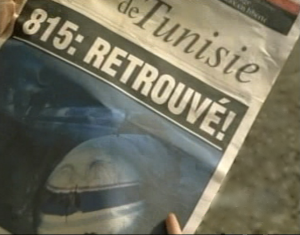 Oh, the tangled web Lost weaves. The episode begins with an underwater search craft stumbling upon the remains of Oceanic Flight 815. Once again, it would seem that the gangs’ flight did really crash after all. But not so fast. Interestingly, the parts of the plane that are being shown underwater—the nose for example—had already been seen on the island. So how can it be in two places at once? Unless, as one of the sub-theories of The Myth of Lost theory suggests, this is the real-life version of the plane that exists in the simulation. Another possibility is that this is a dummy plane with dummy corpses or substitute bodies meant to decoy whatever really happened to flight 815. In other words, Oceanic may have staged this wreckage.
Oh, the tangled web Lost weaves. The episode begins with an underwater search craft stumbling upon the remains of Oceanic Flight 815. Once again, it would seem that the gangs’ flight did really crash after all. But not so fast. Interestingly, the parts of the plane that are being shown underwater—the nose for example—had already been seen on the island. So how can it be in two places at once? Unless, as one of the sub-theories of The Myth of Lost theory suggests, this is the real-life version of the plane that exists in the simulation. Another possibility is that this is a dummy plane with dummy corpses or substitute bodies meant to decoy whatever really happened to flight 815. In other words, Oceanic may have staged this wreckage.
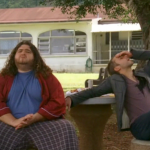 Just as predicted in “The Myth of Lost,” not all of the castaways have made it off the island—at least not this time. Apparently, there are only six, and my guess is that all of them will need to go back if they want to be cured.
Just as predicted in “The Myth of Lost,” not all of the castaways have made it off the island—at least not this time. Apparently, there are only six, and my guess is that all of them will need to go back if they want to be cured.
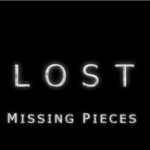 Thirteen webisodes/mobisodes that were released weekly from November 2007 to February 2008 on abc.com (and Verizon mobile phones). Running between 1:22–3:27 in length, each mobisode filled in a gap in the story from LOST’s first three seasons. Episodes can now be found on YouTube. What follows below is the name of each episode, a brief description, and some points on how it fits in with the simulation theory presented in “The Myth of Lost.”
Thirteen webisodes/mobisodes that were released weekly from November 2007 to February 2008 on abc.com (and Verizon mobile phones). Running between 1:22–3:27 in length, each mobisode filled in a gap in the story from LOST’s first three seasons. Episodes can now be found on YouTube. What follows below is the name of each episode, a brief description, and some points on how it fits in with the simulation theory presented in “The Myth of Lost.”
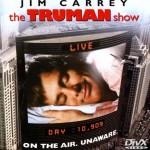 What if you were the only real person in this world and everyone and everything else was just some kind of simulation created to help give you the experience of your life? There has been at least one Twilight Zone based upon this premise, and the movie, The Truman Show, also explored a similar concept. I wrote about this quite a bit in Layman* and contrasted it to The Matrix myth where everyone is sharing the simulation together. In Layman, the protagonist decides that the world isn’t real, but he can’t decide if it’s all just his dream, or the dream of the entire world. I won’t give away the conclusion he comes to, but I will say that I get the feeling that we’re all sharing a collective dream with bits and pieces that are unique to each of our lives.
What if you were the only real person in this world and everyone and everything else was just some kind of simulation created to help give you the experience of your life? There has been at least one Twilight Zone based upon this premise, and the movie, The Truman Show, also explored a similar concept. I wrote about this quite a bit in Layman* and contrasted it to The Matrix myth where everyone is sharing the simulation together. In Layman, the protagonist decides that the world isn’t real, but he can’t decide if it’s all just his dream, or the dream of the entire world. I won’t give away the conclusion he comes to, but I will say that I get the feeling that we’re all sharing a collective dream with bits and pieces that are unique to each of our lives.
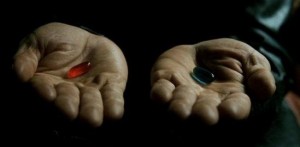 There’s a great scene in The Matrix that really reminds me of what’s going on in the world right now.
There’s a great scene in The Matrix that really reminds me of what’s going on in the world right now.
MORPHEUS
This is your last chance. After
this, there is no going back.
You take the blue pill and the
story ends. You wake in your bed
and you believe whatever you want
to believe.
The pills in his open hands are reflected in the glasses.
MORPHEUS
You take the red pill and you stay
in Wonderland and I show you how
deep the rabbit-hole goes.
Neo reaches for a pill but stops as MORPHEUS breaks the silence.
MORPHEUS
Remember, all I am offering you is
the truth. Nothing more.
Neo opens his mouth and swallows the red pill.
MORPHEUS
Follow me.
 The Layman’s Answers To Everything is a spiritual comedy (or spiromedy) about an unlucky guy who’s searching for what he’s meant to do with his life. After experiencing many challenges and meeting a bizarre cast of characters, he stumbles upon secret messages hidden in TV, movies, and music that are aimed at guiding humanity. Using these messages, he starts a new religion which changes his life, and ultimately, the world. This is so much more than just a story though, because throughout the journey, we learn how to discover and fulfill our own destiny using the clues of the universe that are all around us.
The Layman’s Answers To Everything is a spiritual comedy (or spiromedy) about an unlucky guy who’s searching for what he’s meant to do with his life. After experiencing many challenges and meeting a bizarre cast of characters, he stumbles upon secret messages hidden in TV, movies, and music that are aimed at guiding humanity. Using these messages, he starts a new religion which changes his life, and ultimately, the world. This is so much more than just a story though, because throughout the journey, we learn how to discover and fulfill our own destiny using the clues of the universe that are all around us.
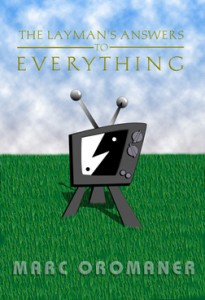 The book I’m writing is called The Layman’s Answers To Everything. It’s a spiritual comedy—or spiromedy— about an unlucky guy who’s searching for what he’s meant to do with his life. After experiencing many challenges and meeting a bizarre cast of characters, he stumbles upon secret messages hidden in TV, movies, and music that are aimed at guiding humanity. Eventually, he uses these messages to start a new religion which changes his life, and ultimately, the world. Really, this is so much more than just a story though, because throughout the journey, we learn how to discover and fulfill our own destinies using the clues of the universe that are all around us.
The book I’m writing is called The Layman’s Answers To Everything. It’s a spiritual comedy—or spiromedy— about an unlucky guy who’s searching for what he’s meant to do with his life. After experiencing many challenges and meeting a bizarre cast of characters, he stumbles upon secret messages hidden in TV, movies, and music that are aimed at guiding humanity. Eventually, he uses these messages to start a new religion which changes his life, and ultimately, the world. Really, this is so much more than just a story though, because throughout the journey, we learn how to discover and fulfill our own destinies using the clues of the universe that are all around us.
 I’ve come to the conclusion that while still very entertaining and intriguing, Lost has become a completely different show. Once falling in the realm of myth or sci-fi/fantasy, now, I’d say it’s more some suspense/action adventure drama. There really isn’t a lot of mythology on the show anymore, and that is exactly the scenario I had feared which inspired me to write The Myth of Lost. At only three episodes into the new season, Lost definitely has time to redeem itself, but I really wish it would start answering the questions about the mythology before giving us new, relatively unrelated plot mysteries. Still, the more questions Lost leaves unanswered, the more satisfying a book with a theory that answers them is likely to be, so I guess I won’t look a gift horse in the mouth.
I’ve come to the conclusion that while still very entertaining and intriguing, Lost has become a completely different show. Once falling in the realm of myth or sci-fi/fantasy, now, I’d say it’s more some suspense/action adventure drama. There really isn’t a lot of mythology on the show anymore, and that is exactly the scenario I had feared which inspired me to write The Myth of Lost. At only three episodes into the new season, Lost definitely has time to redeem itself, but I really wish it would start answering the questions about the mythology before giving us new, relatively unrelated plot mysteries. Still, the more questions Lost leaves unanswered, the more satisfying a book with a theory that answers them is likely to be, so I guess I won’t look a gift horse in the mouth.




 The Layman’s Answers To Everything is a spiritual comedy (or spiromedy) about an unlucky guy who’s searching for what he’s meant to do with his life. After experiencing many challenges and meeting a bizarre cast of characters, he stumbles upon secret messages hidden in TV, movies, and music that are aimed at guiding humanity. Using these messages, he starts a new religion which changes his life, and ultimately, the world. This is so much more than just a story though, because throughout the journey, we learn how to discover and fulfill our own destiny using the clues of the universe that are all around us.
The Layman’s Answers To Everything is a spiritual comedy (or spiromedy) about an unlucky guy who’s searching for what he’s meant to do with his life. After experiencing many challenges and meeting a bizarre cast of characters, he stumbles upon secret messages hidden in TV, movies, and music that are aimed at guiding humanity. Using these messages, he starts a new religion which changes his life, and ultimately, the world. This is so much more than just a story though, because throughout the journey, we learn how to discover and fulfill our own destiny using the clues of the universe that are all around us. The book I’m writing is called The Layman’s Answers To Everything. It’s a spiritual comedy—or spiromedy— about an unlucky guy who’s searching for what he’s meant to do with his life. After experiencing many challenges and meeting a bizarre cast of characters, he stumbles upon secret messages hidden in TV, movies, and music that are aimed at guiding humanity. Eventually, he uses these messages to start a new religion which changes his life, and ultimately, the world. Really, this is so much more than just a story though, because throughout the journey, we learn how to discover and fulfill our own destinies using the clues of the universe that are all around us.
The book I’m writing is called The Layman’s Answers To Everything. It’s a spiritual comedy—or spiromedy— about an unlucky guy who’s searching for what he’s meant to do with his life. After experiencing many challenges and meeting a bizarre cast of characters, he stumbles upon secret messages hidden in TV, movies, and music that are aimed at guiding humanity. Eventually, he uses these messages to start a new religion which changes his life, and ultimately, the world. Really, this is so much more than just a story though, because throughout the journey, we learn how to discover and fulfill our own destinies using the clues of the universe that are all around us.
